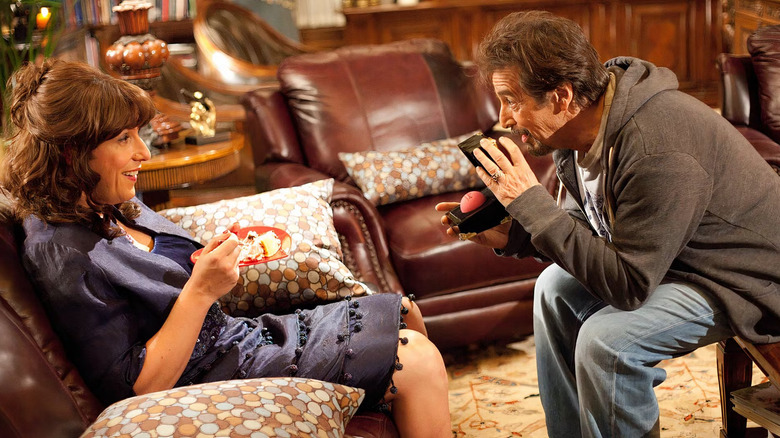“Jack and Jill” is Al Pacino’s lowest-rated film, sitting at a measly 3% on Rotten Tomatoes. The Tomatometer consensus reads “impossible to recommend on any level whatsoever.” Jennie Punter of Globe and Mail calls the movie “cruel and creepy, not funny.” Mary F. Pols from Time magazine wrote, “More than 24 hours has passed since I watched the new Adam Sandler movie ‘Jack and Jill’ and I am still dead inside.” The movie’s only achievement is winning all 12 of its Razzie nominations, including Worst Picture, Worst Director, Worst Actor, Worst Actress (with Adam Sandler winning for both), and Worst Screenplay.
Adam Sandler plays both Jack, an advertising executive, and his twin sister Jill, who is the worst of Jewish stereotypes: an obnoxious, neurotic, and whiny nag. The “humor” is ugly and mean: the cross-dressing invites countless transphobic jokes about her masculine appearance, and there are fatphobic jokes about her being too heavy for a pony that collapses. There’s also juvenile gags about diarrhea.
However, there is one small glimmer in “Jack and Jill” that is surprisingly hilarious. As the Cracked oral history explains, uncredited writer Robert Smigel introduced a storyline featuring Al Pacino (yes, that Al Pacino) who falls in love with Jill. Jack convinces him to participate in a Dunkin’ Donuts commercial in exchange for getting to know Jill, despite her disinterest. Al Pacino’s genuinely invested performance is what saves “Jack and Jill” from being completely dreadful.
‘Say hello to my chocolate blend’
While Adam Sandler gives a smug performance that insists everyone will be charmed by his swirling-the-gutter humor, Al Pacino takes himself seriously and approaches his role with sincerity. His performance makes the humor come from his dedication and almost trance-like obsession with Jill, not the callous idea that she is too unconventionally attractive. Al Pacino might as well be performing Shakespeare’s “Richard III” from the way he is so laser-focused on Jill and speaks about her with such romantic eloquence, comparing her to Dulcinea from “Don Quixote” or wistfully observing, “Your sister and I grew up on the same streets. When I look at her, I see me.” But the best joke of all comes when Jill accidentally breaks his Oscar. She exclaims, “Oh, my God! I’m so sorry! I’m sure you have others, though.” His reply, “Uh, you’d think so, but oddly enough, I don’t” is a priceless commentary on his baffling lack of awards recognition.
The most recognizable part of “Jack and Jill” is the Dunkaccino commercial, and it has become an internet meme. Wearing a suit that has pictures of donuts on the inner lining, Al Pacino raps his most famous catchphrases and shuffles his feet like an overexcited toddler to promote the Dunkaccino — a blend of coffee and hot chocolate. In the final scene, when he tells Jack to burn the commercial and destroy all the copies, “Jack and Jill” lets us know that Al Pacino the actor is very much in on the joke. He knows that in real life, this would be scraping the bottom of the barrel and downright embarrassing. This winking, meta acknowledgement makes the Dunkaccino sequence even funnier and Al Pacino’s participation and willingness to be so goofy even more endearing.
A mission to make bad movies better
Why did the legendary actor from “The Godfather” make a movie that so openly lampoons himself in the first place? The actor admits in a 2019 GQ interview he has been falling into a “perverse” habit of joining bad films to “try to make them better.” Most recently, he told The New York Times why he took on the role:
“It came at a time in my life that I needed it, because it was after I found out I had no more money. My accountant was in prison, and I needed something quickly. So I took this. There’s this thing I do in that film: They got me doing a Dunkin’ Donuts commercial. You know how many people think I actually made that commercial?”
Despite having to do “Jack and Jill” just for a paycheck, Al Pacino gives it his all and is willing to poke fun at himself. Robert Smigel tells Cracked, “I just loved how much Pacino cared. He just emanated joy because he was so excited and committed to making his part as funny as it could be,” and Pacino would often call him with ideas. You can really see this enthusiasm shine on screen.
Al Pacino could have easily phoned it in — just like his contemporary, Robert De Niro, in films like “The Adventures of Rocky and Bullwinkle” or “The War with Grandpa.” “Jack and Jill” showcases the mark of a true actor: someone who commits and goes all the way for a role, no matter what. “Jack and Jill” is a nightmare to get through outside of Al Pacino’s scenes, where you can tell that he’s having a blast. The humor that riffs on his stardom is sharp and clever; if only that type of writing had been in the rest of the movie.







